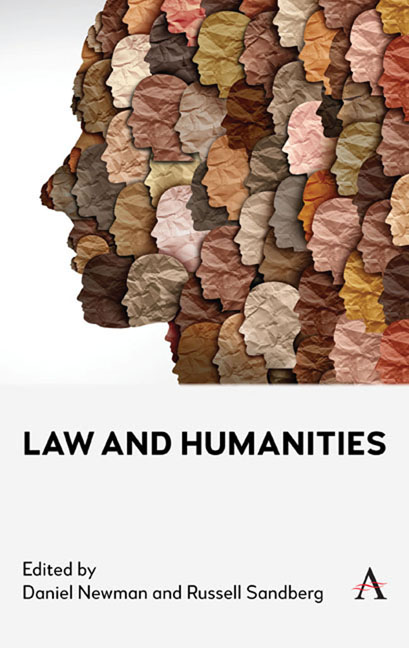Book contents
- Frontmatter
- Contents
- Preface
- List of Contributors
- Chapter One Introducing Law and Humanities
- Chapter Two Law and Archaeology
- Chapter Three Law and Comics/Graphic Justice
- Chapter Four Law and Film
- Chapter Five Law and Geography
- Chapter Six Law and History
- Chapter Seven Law and Literature
- Chapter Eight Law and Philosophy
- Chapter Nine Law and Popular Music
- Chapter Ten Law and Religion
- Chapter Eleven Law and Television
- Chapter Twelve Law and Theatre
- Chapter Thirteen Law and Theology
- Chapter Fourteen Law and Video Games
- Chapter Fifteen Conclusion: Subverting the Law and Humanities Canon
- Index
Chapter Four - Law and Film
Published online by Cambridge University Press: 27 March 2024
- Frontmatter
- Contents
- Preface
- List of Contributors
- Chapter One Introducing Law and Humanities
- Chapter Two Law and Archaeology
- Chapter Three Law and Comics/Graphic Justice
- Chapter Four Law and Film
- Chapter Five Law and Geography
- Chapter Six Law and History
- Chapter Seven Law and Literature
- Chapter Eight Law and Philosophy
- Chapter Nine Law and Popular Music
- Chapter Ten Law and Religion
- Chapter Eleven Law and Television
- Chapter Twelve Law and Theatre
- Chapter Thirteen Law and Theology
- Chapter Fourteen Law and Video Games
- Chapter Fifteen Conclusion: Subverting the Law and Humanities Canon
- Index
Summary
Sam Bowden:
A lawyer should represent his client.
Max Cady:
Should ZEALOUSLY represent his client within the bounds of the law. I find you guilty, counselor! Guilty of betrayin’ your fellow man! Guilty of betrayin’ your country and abrogatin’ your oath! Guilty of judgin’ me and sellin’ me out! With the power vested in me by the kingdom of God, I sentence you to the Ninth Circle of Hell! Now you will learn about loss! Loss of freedom! Loss of humanity! Now you and I will truly be the same.
(Cape Fear 1991)Introduction
There has always been a mild obsession with lists of ‘best law/lawyer films’ as a starter for any work using film in the study of law which can be found from the turn of the century up until the time of writing. There are also Guides that exist to provide law teachers with material, as well as accounts of how the justice system operates in practice. In addition the role of ideology in film continues to be a theme. Interest comes, too, from slightly unexpected quarters. The impact of film generally as well as certain specific areas like race is also encountered as is writing on strongly related areas. Originally interest in the cinematic portrayal of law and lawyers tended to focus on the traditional American courtroom drama with specific attention on two classic films. First Sidney Lumet’s 1957 film Twelve Angry Men and second Robert Mulligans 1962 offering To Kill a Mockingbird. It also started with American legal academics who had an interest in film as a cultural phenomenon. The two films, noted above, were selected by the American Film Institute as the two finest courtroom dramas, which was defined as ‘a genre of film in which a system of justice plays a critical role in the film’s narrative’; two iconic actors, Henry Fonda and Gregory Peck, standing up against all odds to support the idea of ‘justice’. Both took up an unpopular stance demonstrating the importance of a fair trial against a backdrop of prejudice. The two films are powerful pieces of social drama with life-and-death decisions. However, Henry Fonda, as Davis Juror 8, in Twelve Angry Men, was not a lawyer but a member of the jury charged with determining the guilt or innocence of a young man accused of murder.
- Type
- Chapter
- Information
- Law and Humanities , pp. 51 - 68Publisher: Anthem PressPrint publication year: 2024



